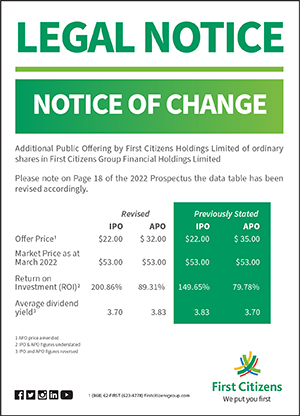Economic Impact of Climate Change in the Caribbean
Commentary

The Caribbean has been blessed with picturesque landscapes, irresistible pristine beaches and a melting pot of races and cultural heritage, making it an idyllic vacation hotspot for scores of tourists globally. Each year, thousands of tourists from major source markets such as the United States of America, Canada and the United Kingdom partake in exhilarating activities that each distinctive island offers. Fauna, Flora and a plethora of prime coastlines coupled with unique architecture, aid in the accumulation of visitor expenditure as a proportion of total exports of 21.2%. The Caribbean is one of the most tourism dependent regions of the world despite having booming industries such as bauxite, petroleum and international banking. With tourism being such a high dependency sector due to its contribution to economic growth and foreign exchange earnings, there are various threats to be wary of; one of the top contenders being climate change.
According to the National Aeronautics and Space Administration (NASA), climate change is a long-term change in weather patterns that have come to define Earth’s local, regional and global climates. Changes observed in Earth’s climate since the early 20th century are primarily driven by human activities; particularly fossil fuel burning which increases heat-trapping greenhouse gas levels in Earth’s atmosphere, raising Earth’s average surface temperature. The increase in the Earth’s temperature since the Industrial Revolution is estimated at 1 degree Celsius and is believed to be accelerating. Each successive decade since the 1980’s has been warmer than the previous one. The past six years (2015-2020) recorded the warmest periods ever, with 2020 being the hottest year on record. The evidence of the daunting effects of added pressure on the Earth’s atmosphere can be recognized by the increased occurrence and severity of natural disasters.
Caribbean nations have natural climate-sensitive ecosystems and are susceptible to rising sea levels and natural disasters. Despite the differences in many Caribbean islands, climate change is detrimental to all. The Intergovernmental Panel on Climate Change (IPCC) recorded that average temperatures in the region have increased by 0.1 degrees to 0.2 degrees over the past three decades. Rainfall patterns have shifted in the region, with the number of consecutive dry days expected to increase. Sea levels have also risen by about two to four centimeters per decade over the past thirty-three years. This trend poses severe risks for regions with fresh water resources and to its coastal population dependent on tourism and agriculture. The statistics can be illustrated in the case study of Barbados. The Barbadian economy attracts more than 1.1 million visitors per year. Tourism is a major foreign exchange earner and contributor to the country’s GDP. It indirectly accounts for 39% of GDP and employs 38% of the labour force. It must be noted, that more than 50% of Barbadians live in close proximity to or on the coast thus, they will suffer major economic losses by rising sea-levels, coastal erosion and saline intrusion.
The economic cost associated with sluggish action regarding climate change is immensely high. Projections indicate that losses in the Caribbean alone could total USD22 billion annually by 2050.The figure is estimated at roughly 10% of the current Caribbean economy. A similar plea is echoed within the Paris Agreement which states that the cost of climate inaction far outweighs the cost of reducing carbon pollution. A 2018 study shows that if the United States failed to meet the Paris climate goals, it could cost their economy USD6 trillion dollars in the coming decades. A worldwide failure to meet the Nationally determined contributions (NDC’s) currently laid out in the agreement, could reduce global GDP by more than 25% by the end of the century.
The World Health Organization (WHO) estimates that worldwide, between 2030 and 2050, an additional 250,000 deaths per year will occur as a result of climate change. Although the statistics are alarming internationally, the response to the matter has been unhurried. Due to the major vulnerabilities that the Caribbean is exposed to, mitigation and adaption measures must be urgently deployed. The Inter-American Development Bank (IDB) has been proactive by implementing measures that will decelerate the medium to long term effects of climate change. The bank has designed a toolkit that includes a reserve fund, fast-distributing credit lines and sovereign insurance facilities to enhance financial protection and preparedness. Adaption methods were also initialized by the Bank as they have supported the Holetown Beach improvement project and the Rockley to Coconut Court waterfront improvement project in Barbados. The project created 4.5 km of continuous safe beach access and increased volume by 16000km.
The Caribbean region continues to be plagued by the ramifications of climate change and is now compounded with the ever-evolving Covid-19 pandemic which in tandem has decimated the tourism sector. According to the results of the Business Impact and Recovery Survey conducted by the Caribbean Hotel and Tourism Association, there was a loss of 74% of revenue in 2020 against the forecast prior to the pandemic. The arrival of international tourists in 2020 declined by 84% in comparison with the previous year. The reluctance to travel further worsened in 2021 whereby the average global decline stood at 80-90%. Due to the interconnectedness of the tourism industry, the decline was even more overwhelming, affecting the labour market as well as the downstream and upstream markets. Globally, the blow to international tourism due to Covid-19, resulted in a loss in GDP of more than USD4 trillion for the years 2020 and 2021. Small Island Developing States such as the Caribbean will be affected the most as the decline in tourists will precipitate a drastic drop in real GDP. Given the importance of this industry to the Caribbean, it is imperative to closely monitor the factors that will have a direct impact on this major revenue earner.
As the planet continues to house 7.753 billion individuals, it is our social responsibility to implement measures that would aid in the sustainability of our planet. As individuals, we can make it our personal objective to incorporate mechanisms and measures to ensure that economic or environmental damage to our planet is limited by reducing our carbon footprint.
DISCLAIMER
First Citizens Bank Limited (hereinafter “the Bank”) has prepared this report which is provided for informational purposes only and without any obligation, whether contractual or otherwise. The content of the report is subject to change without any prior notice. All opinions and estimates in the report constitute the author’s own judgment as at the date of the report. All information contained in the report that has been obtained or arrived at from sources which the Bank believes to be reliable in good faith but the Bank disclaims any warranty, express or implied, as to the accuracy, timeliness, completeness of the information given or the assessments made in the report and opinions expressed in the report may change without notice. The Bank disclaims any and all warranties, express or implied, including without limitation warranties of satisfactory quality and fitness for a particular purpose with respect to the information contained in the report. This report does not constitute nor is it intended as a solicitation, an offer, a recommendation to buy, hold, or sell any securities, products, service, investment or a recommendation to participate in any particular trading scheme discussed herein. The securities discussed in this report may not be suitable to all investors, therefore Investors wishing to purchase any of the securities mentioned should consult an investment adviser. The information in this report is not intended, in part or in whole, as financial advice. The information in this report shall not be used as part of any prospectus, offering memorandum or other disclosure ascribable to any issuer of securities. The use of the information in this report for the purpose of or with the effect of incorporating any such information into any disclosure intended for any investor or potential investor is not authorized.
DISCLOSURE
We, First Citizens Bank Limited hereby state that (1) the views expressed in this Research report reflect our personal view about any or all of the subject securities or issuers referred to in this Research report, (2) we are a beneficial owner of securities of the issuer (3) no part of our compensation was, is or will be directly or indirectly related to the specific recommendations or views expressed in this Research report (4) we have acted as underwriter in the distribution of securities referred to in this Research report in the three years immediately preceding and (5) we do have a direct or indirect financial or other interest in the subject securities or issuers referred to in this Research report.

